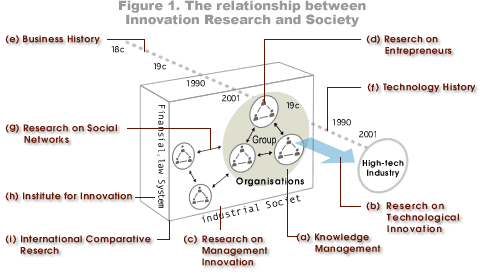
(a) Knowledge Management
A theoretical analysis of the drivers of technological and management innovation, treating the inherent processes as organizational knowledge creation.
(b) Research on Technological Innovation
Empirical classification of the processes involved in technological innovation. For example, detailed consideration of how new ideas generated in universities and corporate research bodies progress to the production stage.
(c) Research on Management Innovation
Scientific examination as to how new organizational structures and management methods emerge, and how large-scale businesses, which may have lost their flexibility, can transform their organizational structure and culture.
(d) Research on Entrepreneurs
Research into the personalities and career profiles of the entrepreneurs who are responsible for technological and managerial innovation.
(e)Business History
Research to elucidate the history of management innovation processes, and to examine how, when and why such innovation occurs when it does.
(f) Technology History
Disclosing the historical processes whereby technology evolves, and analysing the historical background of specific technological innovations and how they influenced subsequent economic development.
(g) Research on Social Networks
An analysis of the types of networks (inter-firm, industrial-academic, etc.) within which innovation occurs, and the ways in which innovation changes these networks.
(h) Institute for Innovation
Research into how various institutions assist innovation, such as the mechanisms for arranging capital supply and risk dispersion, financial and legal systems, and so on, and how the systems themselves are altered by innovation.
(i) International Comparative Research
Research comparing the various activities, organizations and systems pertaining to innovation available in different countries.
Overall View
Having recognized the importance of innovation as a legitimate field of research, of primary importance in such research is a scientific examination of the underlying causes which give rise to innovation, and hence the need for Research on Technological Innovation (b) andResearch on the Management of Innovation (c).
A comprehensive awareness of the characteristics of the entrepreneurs who initiate innovations is necessary in order to better understand the processes of innovation, and so there is a need for Research on Entrepreneurs (d).
In addition, analysis of the networks and links between those bodies engaged in innovation activities (public-sector research centres, private-sector firms, educational establishments, etc.) is an essential part of the social process of innovation, and thus the need for Research on Social Networks (g).
To place such empirical research in context requires an analysis of Business History (e) and Technology History (f) in order to trace the developmental processes of innovation over time. Furthermore, research into the infrastructures influencing the creation of innovation, such as the legal system of intellectual property rights, and monetary and financial systems, is deemed essential to put innovation in a wider context.
Thus, there is a need to conduct research into the Institutions for Innovation (h).
All of the above-mentioned diverse streams of research can be unified by Knowledge Management (a), which is based on the theoretical viewpoint that the ability to innovate is a vital resource of organizations. Finally, in order to generalize from such research, in-depth international comparisons between countries are important, and this is achieved by International Comparative Research (i).
